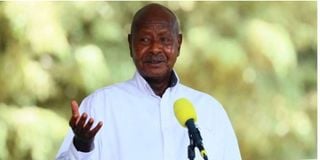Uganda President Yoweri Museveni takes 'forced leave’ after testing positive for Covid-19

Ugandan President Yoweri Museveni has taken "forced leave” and delegated his work for two days (June 8 and 9) to Prime Minister, Robinah Nabbanja, barely a day after testing positive for Covid-19.
What you need to know:
- Mr Museveni, 78, said he has been “very cautious with corona” but recently had to give up on facemasks because they were causing him allergic reactions in the eyes and the throat
- Last month, the World Health Organisation (WHO) chief Tedros Adhanom Ghebreyesus declared Covid-19 over as a global health emergency.
President Museveni said Thursday that he had taken “forced leave” and delegated his work for two days (June 8 and 9) to Prime Minister, Robinah Nabbanja, barely a day after testing positive for Covid-19.
Mr Museveni said he has been “very cautious with corona” but recently had to give up on facemasks because they were causing him allergic reactions in the eyes and the throat.
“Do you remember when I lost my voice twice during the elections? That is part of the allergy. I have, therefore, got the second forced leave in the last 53 years, ever since 1971, when we started fighting Idi Amin. One other time, was when I had a problem of sinuses and I had to lie low for some days at Mweya,” Gen (rtd) Museveni who has been in power since 1986 tweeted Thursday.
Mr Museveni, 78, said he started experiencing mild flu-like symptoms on Tuesday but ignored the feeling and went on with his meetings in Entebbe as well as working on his voluminous State of the Nation Address.
“Yesterday morning, however, I noticed some mild flu-like symptoms in one of the nostrils (the right one). That is when I called my doctors to take samples and rule out Corona. They took three samples- one rapid and two PCRs. The rapid one was negative and so was one of the PCRs. However, one of the PCRs was positive. Taking precautionary measures, I traveled to Kololo, with a separate car from Maama’s car as the samples were taken back for reconfirmation. When I came back from Kololo, it was confirmed that I had Corona,” he explained.
Last month, the World Health Organisation (WHO) chief Tedros Adhanom Ghebreyesus declared Covid-19 over as a global health emergency.
The move came after the WHO's independent emergency committee on the Covid crisis agreed it no longer merited the organisation's highest alert level and "advised that it is time to transition to long-term management of the Covid-19 pandemic".
But the danger was not over, according to Tedros, who estimated Covid had killed "at least 20 million" people -- about three times the nearly seven million deaths officially recorded.
"This virus is here to stay. It is still killing, and it's still changing," he said.
"The worst thing any country could do now is to use this news as a reason to let down its guard, to dismantle the systems it has built, or to send the message to its people that Covid-19 is nothing to worry about."
The UN health agency first declared the so-called public health emergency of international concern (PHEIC) over the crisis on January 30, 2020.
That was weeks after the mysterious new viral disease was first detected in China and when fewer than 100 cases and no deaths had been reported outside that country.
But it was only after Tedros described the worsening Covid situation as a pandemic on March 11, 2020, that many countries woke up to the danger.





